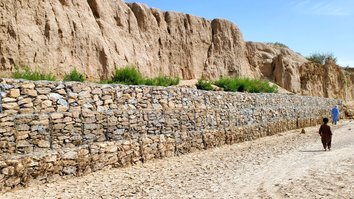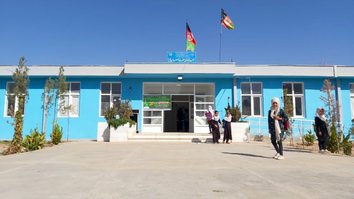ZABUL -- A number of Taliban fighters who once fought the government are now busy working on development projects in their home villages after having renounced violence.
The former fighters now work for the Citizens' Charter Afghanistan Project, a multi-phase infrastructure development project implemented by the Afghan government with international partners.
Launched in October 2016 and funded through October 2021, the Citizens' Charter strives to reduce poverty and strengthen the relationship between rural citizens and the Afghan government.
"Because of my economic issues, I fought for the Taliban for around 10 years in Shahr-e-Safa District [of Zabul Province]," Muhammad Rahim Akhund, a 33-year-old resident of the district, said on August 17.
![Former Taliban member Abdul Qader Zabulwal, 24, helps build a mosque in Seyori District, Zabul Province, on August 17. [Raziq Kandahari]](/cnmi_st/images/2020/08/31/25805-pics__1_-585_329.jpg)
Former Taliban member Abdul Qader Zabulwal, 24, helps build a mosque in Seyori District, Zabul Province, on August 17. [Raziq Kandahari]
"When a retaining wall and road construction project by the Citizens' Charter programme started a year ago in our village, I saw many young people work on the project and receive a good income," he said.
"Therefore, I consulted with my family and myself and decided to leave the battlefield and take part in rebuilding our village and district," Akhund said.
"I have worked with the Citizens' Charter programme in our village for the past 11 months. I earn nearly 15,000 AFN ($195) every month, and I'm happy with my life as I rebuild my village and district instead of destroying it."
Akhund said he has witnessed many changes in his life since he left the Taliban.
"Now, my children go to school in our district, where they receive a religious education," he said. "I have tried to begin my own studies, and I call on my brothers in the Afghan Taliban [to tell them] that the war is not a solution."
"Let's live a peaceful life and contribute to the rebuilding of our villages so that every child can benefit from education and every aspect of life," he added.
Meaningless fighting
Allah Dad Karimzoi, 38, joined the peace process six months ago after fighting alongside the Taliban for six years and now works on the Citizens' Charter project.
"I fought in various Taliban groups for six years in the outskirts of Kalat city, and at the time, my family lived in the Pashtunabad area of Quetta in Pakistan," he said on August 20.
Karimzoi is the breadwinner of a family of eight living in Spina Ghabarga village of Kalat, Zabul Province.
"I lived in severe poverty, but six months ago, I realised that our fighting was meaningless and wouldn't produce any results... I handed over weapons and ammunition the Taliban gave me to a local Taliban commander and told him that I couldn't continue," he said.
Karimzoi now works from 8am to 3pm on a Citizens' Charter project in his village, earning a monthly salary of 12,000 AFN ($156).
"My life has improved, and I work in my orchard in the afternoon," he said.
"My family didn't have a decent life, and it didn't have access to education, but now I thank God again and again that everything has gone well and that my children go to the religious school in our village," he said.
Abdul Qader Zabulwal, 24, a resident of Seyori District in Zabul, fought alongside the Taliban against the government in Shah Joy, Arghandab, Mizan, Shinkay and Seyori districts for three years.
Zabulwal, who gave up fighting a year ago, said he joined the Taliban because of economic issues.
"When I was 21, I left home ... and joined the Taliban," he said on August 16.
"They promised to give me money and said that my life would improve. But I didn't achieve anything after years of fighting other than harassing innocent civilians and destroying our roads and bridges," said Zabulwal.
"My family severed its relations with me," he said. "We were engaged in non-stop fighting for nine months of the year. We were forcing civilians to give us food and shelter, and no one had the courage to reject our requests."
"I tried to avoid going to my district and seeing my fellow villagers for three years, but one day we decided to attack a National Army battalion," said Zabulwal. "While passing through a number of villages, I saw young residents build mosques and work in irrigation canals. I saw young children study in a ruined building with no roof."
"Seeing all this bothered me, but I felt happy that at least our people had jobs in their own villages and had not migrated to work in Iran and Pakistan," he added.
"When I saw that young Afghans were happy as they were busy working in their village, I quit the front and returned to my village," he said.
"I stayed at home for a few days. Later, I started to socialise with young residents of the village. They told me that they would soon begin working on the village's mosque with funding from the Citizens' Charter programme and that they would introduce me to the project engineer to give me work in the project."
"I accepted their offer. As I can read and write, the engineer employed me as a foreman for the project, and I have been earning 18,000 AFN ($234) per month for the past nine months," Zabulwal said.
"My mother, father, sister, brother and sisters-in-law are all happy. I regret my previous life, and I now want to work for peace."
Creating job opportunities
Tribal elders and officials in Zabul Province have welcomed the Citizens' Charter project and say that it has helped drug addicts, the unemployed and former militants.
"The Citizens' Charter programme of the Ministry of Rural Rehabilitation and Development began on May 20, 2017, in Zabul, and it is being implemented in various Zabul districts." said Muhammad Ghairat, director of the programme in Zabul.
"We have built 74 school buildings in the past two years in Kalat city and districts of Zabul Province, and work on 74 more school buildings will begin this year. Our projects, including the construction of retaining walls, canals, karezes [traditional underground irrigation canals], schools, mosques, roads and power plants, are proceeding in 432 villages."
"In the past three years, we have implemented more than 600 small and large projects with a total cost of 230 million AFN ($3 million), and more are under way," said Ghairat.
"Up to 7,000 people have worked for us so far, and their work has indirectly benefited 900 households. Most of the work force of these projects are young people who used to migrate for work to neighbouring countries or were engaged in destructive activities," he added.
"These young Afghans now work in their own villages, and these projects have had positive impacts on residents' lives and helped improve security in the area."
"The Citizens' Charter programme has created jobs for thousands of young residents of Zabul, and we reassure all communities that we will expand this programme to all parts of Zabul Province so that it can shield the young from poverty, joblessness and destructive activities," said Zabul Governor Muhammad Nabi Ahmadzai.
"I can state with confidence that this programme has encouraged... young Afghans who were engaged in fighting to take part in rebuilding activities, and they're now famous as champions of rehabilitation in their respective villages," he said.
"I call on all the Taliban to join the Afghan government's peace process," he added. "They should no longer jeopardise their lives. They ought to serve their people within the government as other young Afghans do."
"This will help them improve their lives and help the country prosper, because if we don't build this country, no one else will build it for us."








Those of Taliban who regret their past and have given up the war and started a peaceful life and play a role in rebuilding their country are forgivable. The Afghan government should appreciate them and prepare them a livelihood, but those who are still fighting against the government, while Americans are leaving Afghanistan, are not forgivable. They must be dealt with decisively.
Reply2 Comment
If such projects are also implemented in other provinces, they will help in bringing security and improve the economy of the people, because they should provide job opportunities to the Taliban, who are joining the peace process; otherwise they will take up arms again and start fighting against the government. One of the causes of insecurity and armed robbery in the country is lack of work and unemployment of youths. The enemies of Afghanistan misuse the compulsion of the country's youths and recruit them into terrorist groups and achieve their goals by these miserable youths. If the country’s youths were provided with job opportunities and the economy of the people was better, they would have never taken up arms and destroyed their country. The international community can buy the war of Afghanistan; that is, they should spend money to boost the people's economy and create jobs. This is how the war will end in this country. The United States and the international community have spent billions of dollars on the war on terror, but they have not been able to win the war. Instead of bringing thousands of troops to Afghanistan and spending so much on their forces in Afghanistan, If they spent 30 percent of that money on infrastructural projects as well as on people's economy and development programs, there would have been no poverty and insecurity in this country now. It is still not late. The international community and the United States must continue their assistance to Afghanist
Reply2 Comment